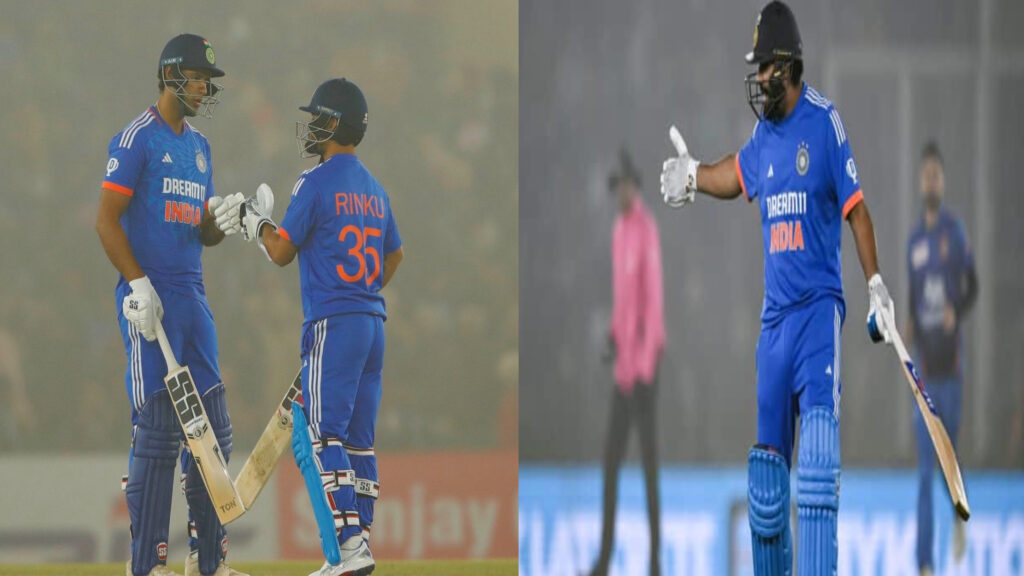In the recent T20 International clash between cricket powerhouses India (IND) and Afghanistan (AFG) at Mohali, a compelling narrative unfolded, showcasing cricketing prowess and strategic maneuvers. Captain Rohit Sharma, at the helm for India, led his team to a convincing victory, securing a 1-0 lead in the three-match series.
The match witnessed a spirited performance from the Indian team, particularly in the bowling department. Rohit Sharma, in the post-match reflections, showered praise on his players, singling out the exceptional efforts of bowlers like Shivam Dube and Rinku Singh. Despite Afghanistan setting a competitive target of 159 runs, the Indian bowlers displayed remarkable resilience and skill to restrict the opposition.
Rohit Sharma’s satisfaction with the team’s performance was evident as he highlighted the positive takeaways from the match. In particular, he commended the spinners for their impressive deliveries and the fast bowlers for their impactful contributions. Expressing contentment, Rohit Sharma acknowledged the challenges faced during the game, emphasizing the significance of gaining positive insights from each encounter.
The captain’s disappointment, however, surfaced when discussing his own run-out. Rohit Sharma, a seasoned campaigner, expressed the innate disappointment that comes with not being able to contribute more with the bat. He underscored the desire to stay at the crease, accumulating runs for the team, yet acknowledged the greater importance of securing the victory. This blend of personal disappointment and team triumph encapsulated the emotional rollercoaster of high-stakes cricket.
The contest itself unfolded in phases, with Afghanistan opting to bat first after losing the toss. The opening batsmen, Rahmanullah Gurbaz and Captain Ibrahim Zadran, faced a slow start, unable to capitalize on the powerplay. Both struggled with a strike rate below 115, setting the tone for a cautious beginning for Afghanistan.
It was Azmatullah Omarzai who attempted to inject momentum, scoring 29 runs in an effort to accelerate the run rate. Mohammad Nabi, playing a crucial role, anchored the innings with a commendable 42 runs off 27 balls, emerging as Afghanistan’s highest scorer. However, the Indian bowlers, led by Axar Patel and Mukesh Kumar, managed to pick up crucial wickets at regular intervals.
The disciplined bowling performance limited Afghanistan to 158 runs for the loss of five wickets in their allotted 20 overs. This set the stage for India’s chase, which, at the outset, seemed challenging after the early dismissal of Captain Rohit Sharma. However, the narrative took an intriguing turn with young Shivam Dube stepping up to the plate.
Dube, positioned at number four, showcased exceptional composure and skill, crafting a match-winning innings. His 60 runs off 40 balls, featuring five fours and two sixes, not only steadied the ship but also provided the impetus needed for India’s successful run chase. While Shubman Gill contributed a valuable 23 runs, the partnership between Dube and Tilak Varma became the cornerstone of India’s victory.
The innings from Dube was a testament to India’s depth in batting, strategically placing him at number four. The decision proved instrumental in overcoming the early setback, providing stability and flair to the chase. Alongside Dube, Tilak Varma’s 26 runs, Jitesh Sharma’s 31, and Rinku Singh’s unbeaten 16 all played pivotal roles in securing the win.
Looking ahead, the focus shifts to the second T20 International scheduled for January 14 in Indore. India, buoyed by their comprehensive victory, will aim to build on the positive momentum. The series presents an opportunity for both teams to showcase their skills, setting the stage for an exciting encounter that cricket enthusiasts around the world eagerly anticipate.

